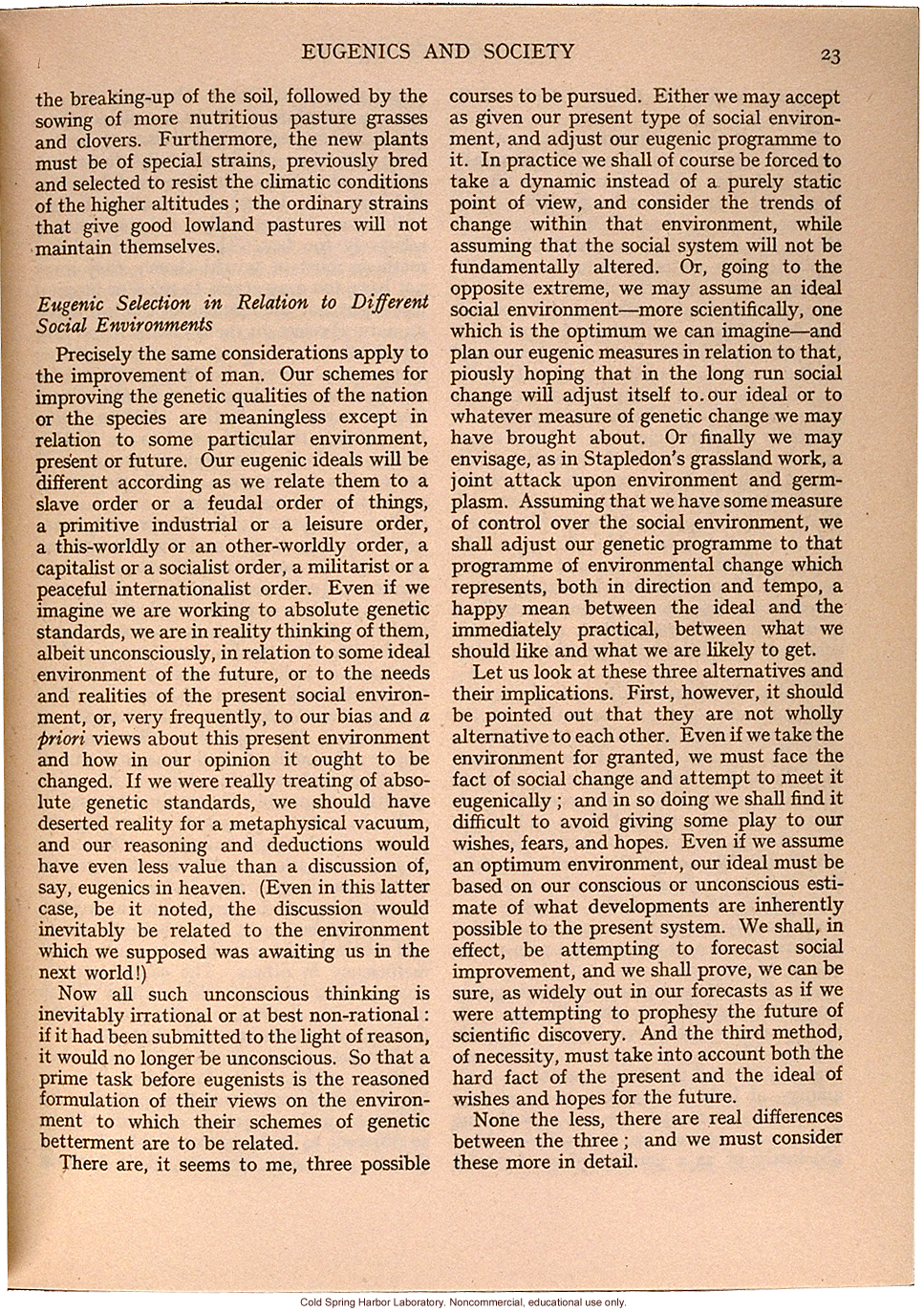Eugenics and Society 23
the breaking-up of the soil, followed by the sowing of more nutritious pasture grasses and clovers. Furthermore, the new plants must be of special strains, previously bred and selected to resist the climatic conditions of the higher altitudes; the ordinary strains that give good lowland pastures will not maintain themselves.
[italics]Eugenic Selection in Relation to Different Social Environments[end italics]
Precisely the same considerations apply to the improvement of man. Our schemes for improving the genetic qualities of the nation of the species are meaningless except in relation to some particular environment, present or future. Our eugenic ideals will be different according as we relate them to a slave order or a feudal order of things, a primitive industrial or a leisure order, a this-worldly or other-worldly order, a capitalist or a socialist order, a militarist or a peaceful internationalist order. Even if we imagine we are working to absolute genetic standards, we are in reality thinking of them, albeit unconsciously, in relation to some ideal environment of the future, or to the needs and realities of the present social environment, or, very frequently, to our bias and [italics]a priori[end italics] views about this present social environment and how in our opinion it ought to be changed. If we were really treating of absolute genetic standards, we should have deserted reality for a metaphysical vacuum, and our reasoning and deductions would have even less value than a discussion of, say, eugenics in heaven. (Even in this latter case, be it noted, the discussion would inevitably be related to the environment which we supposed was awaiting us in the next world!)
Now all such unconscious thinking is inevitable irrational or at best non-rational: if it had been submitted to the light of reason, it would no longer be unconscious. So that a prime task before eugenists is the reasoned formulation of their views on the environment to which their schemes of genetic betterment are to be related.
There are, it seems to me, three possible courses to be pursued. Either we may accept as given our present type of social environment, and adjust our eugenic programme to it, In practice we shall of course be forced to take a dynamic instead of a purely static point of view, and consider the trends of change within that environment, while assuming that the social system will not be fundamentally altered. Or, going to the opposite extreme, we may assume an ideal social environment - more scientifically, one which is the optimum we can imagine - and plan our eugenic measures in relation to that, piously hoping that in the long run social change will adjust itself to our ideal or to whatever measure of genetic change we may have brought about. Or finally we may envisage, as in Stapledon's grassland work, a joint attack upon environment and germ-plasm. Assuming we have some measure of control over the social environment, we shall adjust our genetic programme to that programme of environmental cange which represents, both in direction and in tempo, a happy mean between the ideal and the immediately practical, between what we should like and what we are likely to get.
Let us look at these three alternatives and their implications. First, however, it should be pointed out that they are not wholly alternative to each other. Even if we take the environment for granted, we must face the fact of social change and attempt to meet it eugenically; and in so doing we shall find it difficult to avoid giving some play to our wishes, fears, and hopes. Even if we assume an optimum environment, our ideal must be based on our conscious or unconscious estimate of what developments are inherently possible to the present system. We shall, in effect, be attempting to forecast social improvement, and we shall prove, we can be sure, as widely out in our forecasts as if we were attempting to prophesy the future of scientific discovery. And the third method, of necessity, must take into account both the hard fact of the present and the ideal of wishes and hopes for the future.
None the less, there are real differences between the three; and we must consider these more in detail.
[end]


